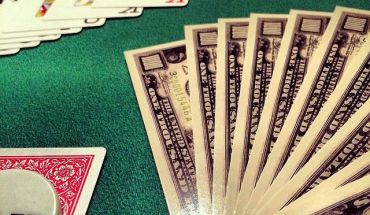I hate to say this, but humans, by nature, are born egocentric beings. It’s a byproduct of our survival instincts. This instinct eventually widens to familial and communal groups, then later, as the emotional maturity level develops, to altruistic endeavors.
I’m about to school your psychological game play, and maybe, make you a better person for it.
Inexperienced players (I’m talking about those who know how the game is played, but most likely, don’t play much) have a habit of centering their game play only by the cards they hold. They won’t buy into a hand unless they have some kind of royal or a set. Bluffing is not part of their play, so their strategy is completely subject to chance. They play with blinders on. It’s them and what lands on the board, regardless of how many players are there. Any raise will cause them to fold, unless they’re holding a pair of royals or aces. This is a poor poker strategy.
Communal players are those that play with the same group constantly. They are friendly players and aren’t really in it for the money, maybe some bragging rights, but it’s about having fun for them. To these players, it’s something to do on their Thursday nights with the gang and are notorious for checking down hands and for non-aggressive play. If you have intentions of becoming a good player, playing with groups like this will either kill your game play or you’ll never be invited back because of your aggressive, or semi aggressive style.
Most online players rarely show the discipline and/or patience to deal with live game play. Their tells also become obvious, however those who have skill are better about their timing and their betting strategy. Many have the signs of the 1st player mentioned; overly focused on their own hand, rather than their opponent’s.
Two pieces of advice.
- Get out of your own head space.
- Don’t check down hands and allow your opponents to stay, especially if you have a decent hand. It may cost nothing to you to do so, but every opportunity you give your opponent to stay in for a communal card is another opportunity you are giving them to beat you. If you are risk adverse, or a penny-pincher, you shouldn’t be gambling in the first place. There’s a reason there’s such a thing as “no-limit holdem'”.
Now something most people don’t consider: the dealer.
You would think that wouldn’t matter, however, very much like roulette, certain dealers have an uncanny habit of flopping consistent types of hands. For example, at my last tournament, regardless of how many times I washed and/or shuffled the deck, I was consistently dropping at least one ace every flop for almost 8 consecutive hands (1 missed one). It wasn’t the same ace back to back, but it was indeed an ace. Why is that? Why does one roulette dealer consistently hit the number 11 seven out of twelve times during their run? Who knows, but it does happen.
Because this does happen, it’s a good idea to watch what hands generally wins at a table. On many occasions, ironically the same kinds of hands will win. On some games I’ve dealt, majority of hands that would win were flushes. On others it would be mid level straights, and I’m not talking about just two or three hands, but five or more hands. Your pair of jacks may look like a great hand, but if flushes have been consistent on the board, and the current flop looks like it will be the same story, if one of your jacks don’t match up to the flush possibility, your pair will mean nothing.
I’m not saying base your entire strategy on what your dealer has been boarding, but pay attention. Phases will occur.



